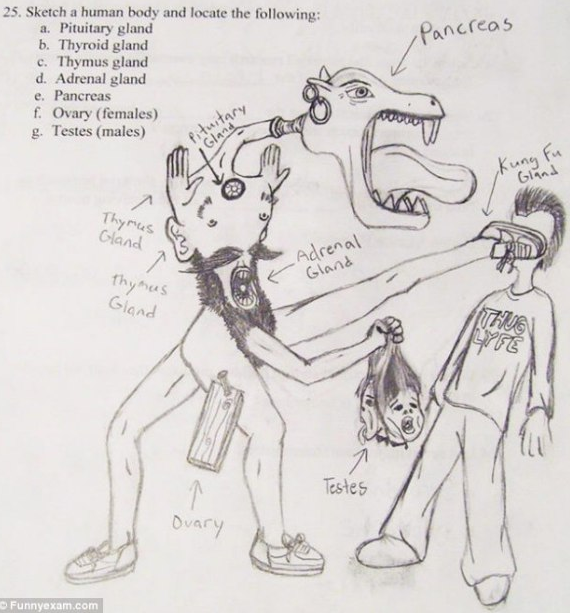05 Aug Breeding brilliant box-tickers
One of the most viewed TED Talks is Sir Ken Robinson’s How Schools Kill Creativity. He performed it back in 2006 and it is well worth a watch if you’re not one of the 40 million who already have. It is a brilliant piece which shakes down the education system and highlights the lack of creativity we promote in schools as we chastise children who make mistakes.
‘Killing creativity’ is a strong notion and it is a sweeping statement. Most of us would probably agree that schools perhaps do not do enough promote creativity but stop short of ‘killing’ it. This has not occurred through intentional means but by the virtue of how educational standards have impinged on our ability to teach and learn. ‘Standards’ require measuring. Measuring requires units of measurement. These manifest themselves as inspection performance and exam results. Exams are set to be passed and boxes made to be ticked. We cannot criticise schools, universities and students to behave and study in order to achieve such the highest standards possible as per the criteria.
Do schools kill creativity?
Anyone with a firm grip on the education system will be well aware of the ‘box ticking’ exercises faced by schools and teachers at national, local and individual levels – it filters down. Whichever way you look at it, the result is that children are taught to do well in exams. It is in their own, their teacher’s and their school’s best interests to do so, and let’s not forget the government’s.
Every subject needs a yardstick and measuring standards, including creative subjects like the arts – where there is a syllabus and a mark scheme like everything else. Even if an A-level student studies art, drama and music they have boxes to tick in order to get an A or A*. As a student, we know the syllabus, we complete the past exam papers and we know the mark schemes. We know how to pass the exam. If we don’t; it is purely because of a lack of preparation.
So do mark schemes and standards kill creativity?
I have met some brilliant young men and women who have graduated from some of the best universities in the country in some pretty heavyweight subjects. There is a very strong correlation between these individuals and certain key traits. They are very bright – excellent at absorbing information, retaining it and applying it to various scenarios and individual cases. These guys are doctors, accountants, consultants, lawyers etc. and we need to keep producing these highly skilled individuals – they are the backbone of our society.
Unfortunately, I also know a number of these skilled people who are not in a graduate job. Why? Because we have too many of these highly-skilled, highly qualified people for the jobs available. We don’t want to stop producing these people; we need to produce more jobs for them. We need a more efficient use of our human capital in order to grow the economy faster.
So, we need to produce more entrepreneurs who start businesses that will employ our graduates. But where are they? Of course, entrepreneurship requires a number of traits. They must be creators and innovators, unafraid of making mistakes and enduring countless failures before success. However, from the age of about 4 to the age of about 24, most Brits have been doing clearly defined tasks that require specific outcomes. Their ability will be judged according to their performance. Following rules and processes without making mistakes is engrained deep within their psyche; even the ‘creative’ ones.
Exams’ impact on enterprise and innovation
Let’s consider the impact this has on entrepreneurship or any career path that requires innovation. There are no boxes to tick. You must simultaneously create your own goals, your own standards and processes without any spoon-feeding. Making mistakes becomes a daily occurrence; failures happen. It was Edison who famously remarked,
“Hell, there are no rules here – we’re trying to accomplish something”
Rules to the creative mind are detrimental to accomplishment. Remember, we need people who can think bigger, who can think outside the box, to become the entrepreneurs and employers of tomorrow. The problem we face is that for the majority of our ‘box-ticking’ breed, rules and standards are a necessity to accomplishment. 20 years of institutionalisation, of being told we must tick boxes and avoid making mistakes is not something we can easily remedy; humans are beings of habit. As a society, we must tackle the root cause of this restrictive mindset to create a shift in motives and output of our education system. We need a much more balanced workforce.
Concluding
Schools will always be bound by having to meet standards and having boxes to tick. We must inspire free-thinking through other channels and, for the good of society and the economy, we must provide direction and purpose and introduce valuable life skills and entrepreneurial behaviour. This is particularly important at a primary level, both Key Stage one and two, where children are rapidly learning new skills and adopting traits that will shape their future successes.
Here’s Sir Ken’s talk:





